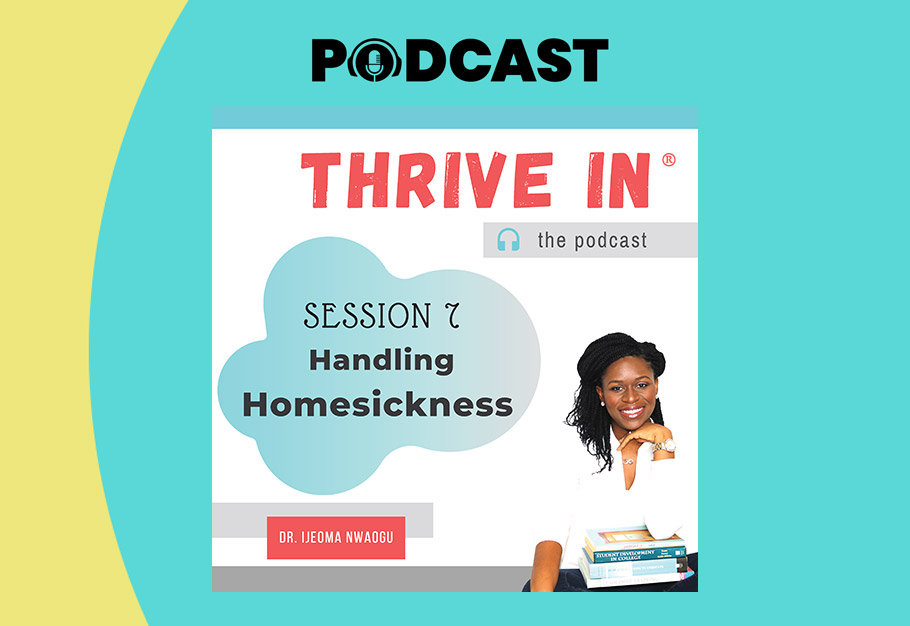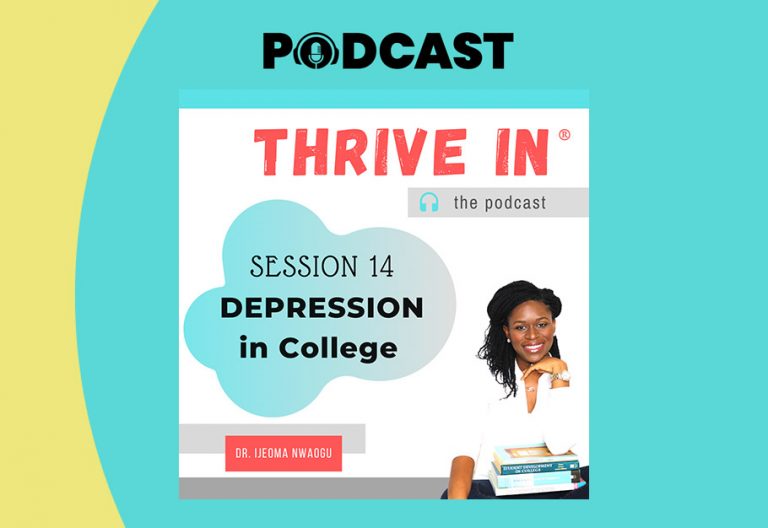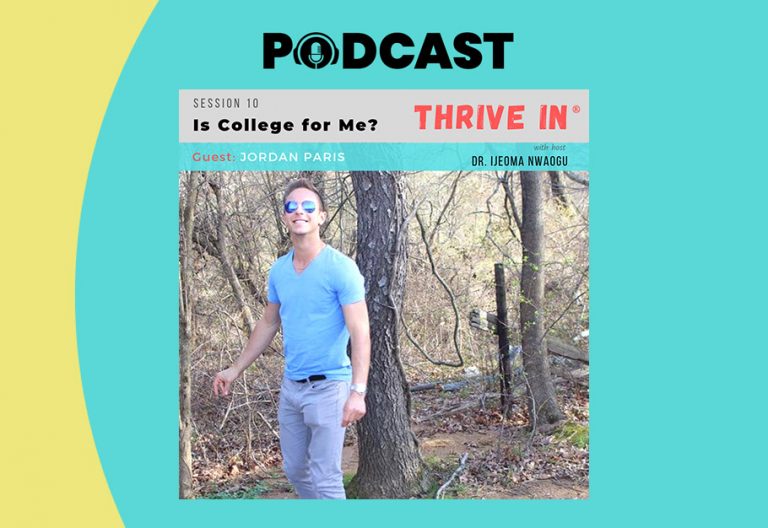0:03
Welcome to Thrive IN™ and greetings from Houston, Texas. This is Dr. IJ, your very own Life Coach. Thrive IN™ is a Life Coaching podcast for college students. And believe me, you are in the right place if you’re eager to become the highest
0:21
and truest version of yourself while making the most of your time in college. This is session number seven. And for this session, I’ll share about a common experience most people feel when they start college for the first time, or when they transfer to a new college. This experience is homesickness. So this is really a special edition to help you if you’re starting a new college or new university. But listen, even if this isn’t your struggle currently, you might gain some takeaways to help a friend. Now and speaking about homesickness, did you know that 69%, that’s most people, 69% of all college students feel severe homesickness at some point in college. That’s pretty staggering. You might experience homesickness during the first few weeks of school, it may not last long. For some people, it’s a day, it’s a week, it’s a month, some people it lasts several months or an entire semester. So it may or may not last long, but it’s certainly something that will affect you at some point in your time as a college student.
1:27
So what is this thing we’re talking about with homesickness? What does that actually mean? Or why does it happen? So homesickness oftentimes is described as a feeling where you miss home, you miss your comfortable room, you miss those home cooked meals, you miss your old friends, and it comes with this nostalgia, where you’re dreaming of home, or you’re frequently thinking about home or the things that made you feel comfortable or happy before you started your new experience in college.
1:57
So when you feel this homesickness, essentially your missing, whatever you consider to be your home where you miss home, you want to connect back with home. Now ‘home’ could have a different definition for each person. Oftentimes, we think of a home as your house, your family house where you grew up. But a home is essentially a place of comfort. And it certainly looks different for everyone. Sometimes you may not miss your family, you may miss something else that is “home” to you. For example, you felt at home with your sports team back in high school, or you felt at home with your church group of people that you grew up with. So home may look differently for you or home for you could mean the assumed definition of home meaning your house or where you grew up with your family, your parents, your siblings.
2:41
So sometimes in college, it’s also a common experience to feel out of place when you’re trying to become established to a new environment, and you’re trying to make new friends. And so with that it oftentimes comes with missing your friends at home or missing your high school buddies. So again, homesickness tends to happen when you haven’t quite gotten used to your new life, and you feel like something is missing, or that something isn’t comfortable or familiar or you don’t yet have that stability that you desire. So then what happens when you have these feelings of homesickness. So in thinking about how homesickness shows up in your life, it can mean that you get back from class and then you go into your dorm room. And when you get back, you have this overwhelming feeling of loneliness. You haven’t yet established a group that makes you feel the sense of belonging. And so sometimes you may find yourself crying or just feeling sad, or feeling very overwhelmed like this new life in college is just a little bit too much.
3:39
So those are some of the emotions and reactions that can show up if you’re feeling homesick. But here’s some things that I want you to really understand about homesickness and that experience. Know that you’ve just undergone a huge transition. And when you transition, you have to give yourself time to adjust to your new situation, and adjustment can take some time, but know that you will certainly get there to a place where you feel things are more fluid more flowing, and you become more comfortable in your space.
4:09
Another thing I want you to keep in mind is to know that this experience is totally normal and common and that you are not alone in this. You may be walking across campus, and it looks like every new student is confident and they know where they’re going. But trust me, you can’t read their thoughts. And they’re most likely thinking the same things that you’re thinking like, “Where am I going? I don’t know where this building is, I haven’t yet identified a group of friends that I can relate” to like, all of these thoughts and feelings are extremely common for first year students or students who are new to a particular campus. So know that you are not alone in this— very common.
4:46
Every human being has a desire to be connected to comfort. So know that you’re not being a big baby, you don’t have a bad attitude, and you’re not being weak and you’re not being immature, you’re being a normal human being who has entered a new space. So I want to help you understand that this is very common, you are not alone. And usually after the first half of your first semester, you’ll likely adjust very well. So hang in there.
5:12
When you think about it leaving home or a familiar situation is actually really difficult no matter what anyone says leaving a situation that you’ve mastered, you know, think about when you were in high school and how you just know your schedule, you know what goes on at home, you know, how your assignments are supposed to be done, like you really mastered that setting. Now you’re in a new setting in college and it certainly will just take some time to readjust to a new situation. Leaving a situation that you’ve already mastered just to enter a new potentially overwhelming new situation does require an adjustment. And it’s actually not that easy. Know that your college setting might actually become this “home” space for you. Once you become very familiar with the college system and how to navigate college life, you can then design your “home” for yourself, in your dorm room, in your apartment, wherever you are, you can certainly design your space to feel at home.
6:07
Let’s say you’re part of a student organization and you all go for a retreat for like two, three days. And then you’re like out in the woods and you’re not so comfortable out in the woods, and you’re dreaming of your new home space, which is the college dorm room or your new apartment. And that space that you were even trying to adjust to has now become your new home. So this process of homesickness is somewhat ongoing depending on your situation. And my goal for you is to design your new situation as a new home for yourself.
6:40
Even after college, there will likely be more times when you’ll feel like you miss home. There’s so many different situations that you’ll encounter throughout your life. So in talking about this idea of homesickness, I certainly don’t want to end this session without offering you some tips or strategies to help you maneuver through this experience of homesickness.
7:00
First tip I have for you is to make sure you call home, you can call your siblings, you can call your parents. Now, notice I didn’t say text. I recognize that text messaging is wonderful, and is the preferred way of communication these days. However, you know, your guardians or your parents appreciate a phone call from you. They want to hear your voice your tone, they want to make sure you’re okay they want to hear details that they may miss if it was just a communication via text message. So make sure once in a while you do give them a call to let them know how you’re doing and tell them the truth about how you’re doing what you’ve succeeded at what you struggle in what you achieved, like talk to them about details as to what’s going on with you in those first few weeks of school.
7:43
So again, you’re going to check in with your parents, your guardians, other family members like your siblings, that really helps you feel at home again, and you can even take it a step further instead of just calling you could also make plans to visit once in a while when you know that you’ve made plans to go home it could at least play calm your spirits down to know that you certainly plan on going and that it will absolutely happen so you don’t have to wonder what am I going to be home again or miss it that much because you know that there is a plan to go back home to visit.
8:13
Research even supports this idea of making sure you always visit home. Studies have shown that returning to your home base or a place of comfort or nostalgia, it really has a healing effect physically. And so with this word homesickness people tend to use it in a figurative way, but it actually is literal. If you spend a lot of time away from home without reconnecting to home, whether it’s via phone call, or visiting or whatever makes you feel at home. If you spend time away from it for a long time you can actually start feeling physically sick because everything is interconnected. All the systems in our body— they are all interconnected. Your emotional wellness, your spiritual wellness, your physiological makeup, your muscular makeup, like all of the different systems in our bodies are connected. And so when you are emotionally unwell or you’re upset or sad because you haven’t reconnected with home, it will impact your physical state so homesickness can actually make you sick.
9:17
Another person you can talk to is whoever is the leader in your residential hall. Some people have RAs resident assistance or any sort of student leader in the halls, make sure you talk to that person. That’s what they’re there for. Ask that person if they’ve ever felt homesickness before. Ask them what did they do to kind of overcome those feelings. Talking to a person about it can help you feel connected with someone else and you have someone who’s listening to you and empathizing with your current situation which can also have a healing and comforting effect.
9:49
So reach out to your hall leader. And just in general, ask for help. If you feel like you’re struggling in an area or you feel overwhelmed, ask for help from your roommates. Again, you hall leader, your RA, an advisor, a counselor on campus. Take advantage of the Counseling Center, it’s free for you most likely as a college student. I wish I took advantage of my college counselor when I was in college, such a great resource. I mean, outside of college people pay hundreds of dollars to see a counselor. People don’t just see counselors because they’re deemed as having the psychological disorder. Absolutely not. Counselors are prepared to support you in many aspects from homesickness to anxiety to those psychological disorders. So it’s on a spectrum. So know that homesickness is a very common thing. There’s nothing wrong with you. It’s a very normal experience. And someone is available on campus to support you and getting through that.
10:42
So the key to it is to not stay silent about it. It’s hard to break your silence about it because people in society oftentimes don’t openly speak about homesickness. Some people feel ashamed about it. Some people feel like you’re the only one some people feel like again, big babies or that they’re too weak to handle college when that’s actually not the case. That’s fake news. So again, the key is to not stay silent about it speak about these experiences, because the more you speak about it with a trusted person, the better you can feel, and the more support you can get to overcome these feelings.
11:17
So please, you don’t have to feel ashamed about homesickness. Also don’t quit school. There are a lot of students who feel very overwhelmed with college and they feel that they miss home too much. And they end up leaving college or leaving their university and go back home. And if college is something that you’ve desired for a long time, I want you to hang in there and just seek the necessary resources to help you get through it. Because you can certainly get through it. Homesickness might be a very short lived experience for you if you connect yourself to the right resources to help you get through it.
11:53
What you could also do is bring things from home that bring you comfort, if it’s a teddy bear that you had growing up, or a blanket or a poster or a picture with your family on it, whatever you can bring from home that will make you feel at home. If you just bring it along with you, that can be helpful as well.
12:12
Now the last piece of advice I’d like to share with you to overcome homesickness is to explore your surroundings, your college experience is a beautiful one. And I’m sure you’re surrounded by a beautiful campus and beautiful people. So go to student programs, pick up an extracurricular activity, go dancing, go hang out with friends, walk around campus and explore the natural beauty and get familiar with your new space. Get familiar with your new home. Because the more exposure you have to your college space, the faster you’re able to adjust to your new setting. So my question for you is: who will you call it home? Who will you tell about these feelings? And will you commit to stay in school? Even if you feel overwhelmed? What can you bring from home next time you visit that’ll make
13:01
you feel at home at college? So I’m curious to know what other tips you may have when it comes to overcoming homesickness. Send me a message to let me know. So there you have it. I hope you gained some really good takeaways to navigate homesickness if that’s something that you’re experiencing.
13:18
So let’s round up this session. Feel free to connect with me at thriveinpodcast.com, where you’ll find loads of exciting resources just for you. Now if you’re interested in being coached by me, make sure you connect with me through the contact form on the website. I also welcome you to check out the course on udemy.com. The name of my course is 7 Critical Areas to Develop before Graduating from College. Believe me, you want to find out what these seven critical areas are if you want to make the most of your time in college and become your greatest and truest self. You could find that information on collegelifecoach.info.
14:00
Now if you love and so appreciate what you’ve gained from this session, I welcome you to visit Apple podcast to rate and review the show. What this does is that it helps other college goers find this podcast. So make sure you send me a message on topics you’d like me to speak about in the future. Follow and like me on social media at the handle. DRIJCLC, which stands for Dr. IJ College Life Coach, again that’s DRIJCLC. I’m wishing you a safe, happy and thriving week. Thanks for listening. Join me for the next session. Love You.






